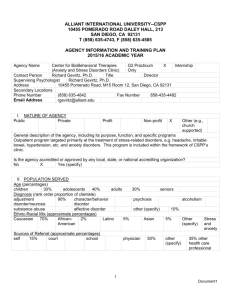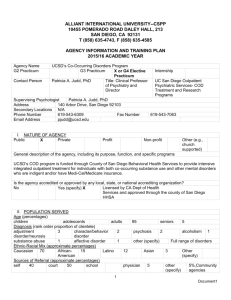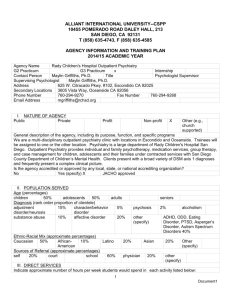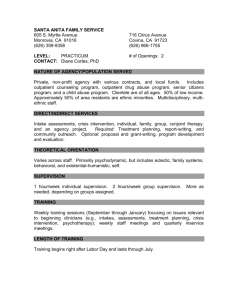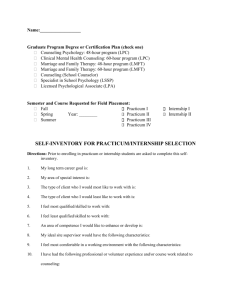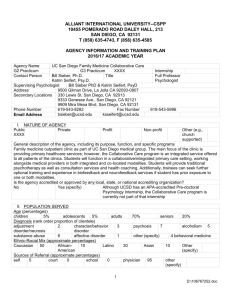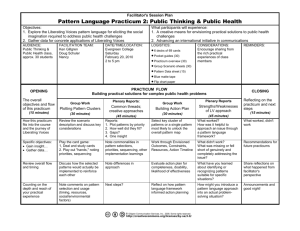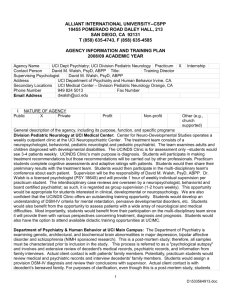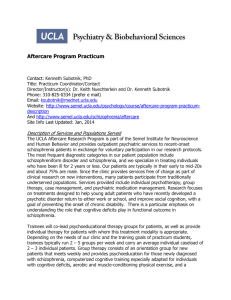Turning Point Crisis Center - Alliant International University
advertisement
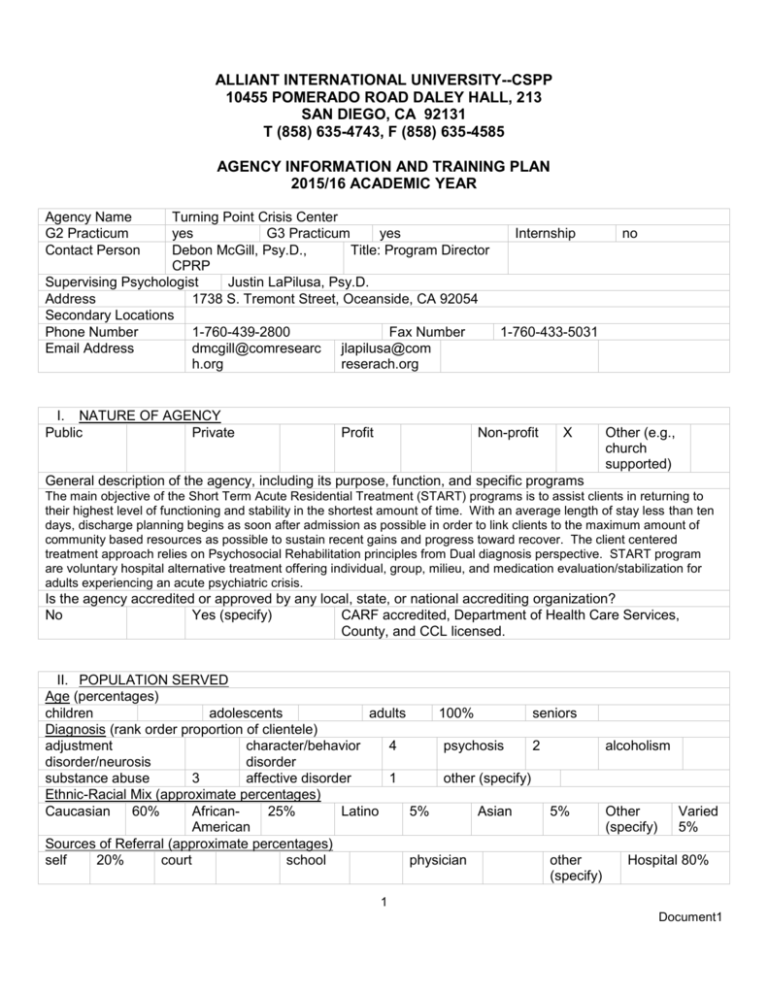
ALLIANT INTERNATIONAL UNIVERSITY--CSPP 10455 POMERADO ROAD DALEY HALL, 213 SAN DIEGO, CA 92131 T (858) 635-4743, F (858) 635-4585 AGENCY INFORMATION AND TRAINING PLAN 2015/16 ACADEMIC YEAR Agency Name G2 Practicum Contact Person Turning Point Crisis Center yes G3 Practicum yes Internship Debon McGill, Psy.D., Title: Program Director CPRP Supervising Psychologist Justin LaPilusa, Psy.D. Address 1738 S. Tremont Street, Oceanside, CA 92054 Secondary Locations Phone Number 1-760-439-2800 Fax Number 1-760-433-5031 Email Address dmcgill@comresearc jlapilusa@com h.org reserach.org I. NATURE OF AGENCY Public Private Profit Non-profit X no Other (e.g., church supported) General description of the agency, including its purpose, function, and specific programs The main objective of the Short Term Acute Residential Treatment (START) programs is to assist clients in returning to their highest level of functioning and stability in the shortest amount of time. With an average length of stay less than ten days, discharge planning begins as soon after admission as possible in order to link clients to the maximum amount of community based resources as possible to sustain recent gains and progress toward recover. The client centered treatment approach relies on Psychosocial Rehabilitation principles from Dual diagnosis perspective. START program are voluntary hospital alternative treatment offering individual, group, milieu, and medication evaluation/stabilization for adults experiencing an acute psychiatric crisis. Is the agency accredited or approved by any local, state, or national accrediting organization? No Yes (specify) CARF accredited, Department of Health Care Services, County, and CCL licensed. II. POPULATION SERVED Age (percentages) children adolescents adults 100% seniors Diagnosis (rank order proportion of clientele) adjustment character/behavior 4 psychosis 2 alcoholism disorder/neurosis disorder substance abuse 3 affective disorder 1 other (specify) Ethnic-Racial Mix (approximate percentages) Caucasian 60% African25% Latino 5% Asian 5% Other Varied American (specify) 5% Sources of Referral (approximate percentages) self 20% court school physician other Hospital 80% (specify) 1 Document1 III. DIRECT SERVICES Indicate approximate number of hours per week students would spend in each activity listed below: Number of Hours Per Week Activity G2 Practicum G3 Practicum Internship Intake Assessment 8-16 hours 8-16 hours Crisis Intervention 4 hours 4 hours Individual Therapy (short-term) 8-12 hours 8-12 hours Individual Therapy (long-term) Group Therapy 2 hours 2 hours Couples Therapy Family Therapy Play Therapy Milieu Therapy 6 hours 6 hours Diagnostic Testing Forensic Assessment Peer Supervision On-going On-going Consultation 1 hour individual; 1 1 hour individual; hour group, URC 2X 1 hour group, per week URC 2X per week Other (specify) If your agency offers any combination of G2 Practicum, G3 Practicum and Internship positions, please describe how they will differ from each other N/A IV. INDIRECT SERVICES Describe, as fully as possible, all indirect services offered (e.g., consultation, public education, etc.) Continual collaboration with treatment providers including but not limited to family members, case managers, payee, housing (current and/or potential), therapists, psychiatrists, and conservator. V. THEORETICAL ORIENTATION Psycho-Social Model of Recovery. Turning Point focuses on evidenced based practices of Cognitive Behavioral Therapy, Motivational Interviewing, Dialectical Behavior Therapy, Cultural Competency, Short-Term Therapy, and Dual Diagnosis (CCISC model – Comprehensive, Continuous, Integrative System of Care). Students are offered and strongly encouraged to attend trainings offered on these practices. VI. TRAINING AND SUPERVISION Supervisor is on site at least 1/2 of the time each supervisee is at the agency? Yes X No Supervisor is licensed at least 3 years? Yes X No How Long? License Number of primary supervisor PSY 25187 Licensed psychologist on staff at least 20 hrs/per week? Yes X No What is the orientation program for new Formal 2 day training within CRF, continuous informal trainees? training What are the overall training goals of the agency? For what is the student being trained? 2 Document1 Comprehensive completion of behavioral assessment, diagnostic differentiation, treatment planning, discharge planning (recognition of resources), and psychoeducational groups. Additionally, crisis intervention and collaboration with treatment providers. What training does the agency offer in providing culturally sensitive services? Community Research Foundation offers on-going cultural competency formal 4 hour trainings throughout the year on different topics (i.e. gangs, older adult, LGBTQI, and guest speakers). Cultural Sensitivity is offered as in-house training 1 hour per year. Cultural client specific services are discussed at every utilization review meeting. Training methods (indicate frequency and length per week): Activity Individual Supervision - Licensed Ph.D./Psy.D. - Other Group Supervision Peer supervision Team Meetings Case Conferences Co-therapy with Staff Observation/Discussion with Staff Seminars, Workshops, etc. Videotaping of sessions Comments G2 Practicum Number of Hours Per Week G3 Practicum Internship 1 hour 1 hour 2-3 hours 2-3 hours 1-2 hours 1 hour 1-2 hours 1 hour Every shift all shift Variable Available All shifts Variable Available What training do you offer in general safety procedures? Preventing and Responding to Aggressive client is a 1 hour requirement. Facility tour given within first two shifts (i.e. fire panel, water shut off). Fire drills every month. Natural Disaster training (1 hour) per year. Bomb threat and medical emergencies (1 hour) per year. All staff are CPR/First Aid Certified. All management team is AED trained. Specific procedures for your agency, e.g. violent patients? We are a “no touch” facility. We do not do restraints. If verbal de-escalation is not working the police are called. VII. ADMINISTRATION Staff and Trainees How many clinical staff are on site? full-time What disciplines are represented? MD 1 PHD/ 2 LCSW PsyD 10 RN part-time 1 MFT 2 17 Other 21 3 Document1 What opportunities do trainees have to interact with non-psychologists? Every shift How many trainees does the agency usually have at one time? Full-Time Half-Time 5-6 Is there always staff coverage during the time the trainees are there? Yes X No If no, give specifics Required and Preferred Days Are there any required days the students Yes X No If yes, what days Tuesdays OR must be at the agency? Fridays and specific times From Variable for individual To supervision; for group approx. 11AM – 1PM What is scheduled during these required times? supervision Are there preferred days/times the agency wants students to be there? No Yes X If yes, which? One day shifts (8 am-4pm) one evening (4-12) and one weekend shift (either am or pm) Are trainees expected to work Evenings yes Weekends yes Are trainees on-call when they are not at the agency? Yes No X Starting and Ending Dates Training begins July/August/Sept And ends May/June/July Vacation How many weeks of vacation will the trainee be given during the training period? 2 weeks / 6 shifts Does vacation time coincide with CSPP/AIU semester breaks? Yes No It can Stipend Is there a stipend? No X Yes if yes, indicate amount below G2 Practicum G3 Practicum Internship Are taxes and social security deducted? No Yes Is there a mileage allowance? No Yes VIII. FACILITY Students have access to own office rotate as available yes administrative support disability access no share permanently if they rotate, is there a clearly posted schedule? No computers yes IX. EQUIPMENT Play Therapy: If the agency sees children, is there adequate Yes play therapy equipment? Assessment Materials If testing is done, are there adequate test Yes materials? What recording equipment is available to students? Audio Video Do you have written manuals for the following X Yes No copy machines X yes No N/A X No N/A X None X 4 Document1 general policies & procedures yes safety yes orientation for new trainees X. APPLICATION PROCEDURE Please indicate the number of openings by year level- 5-6 total G2 Practicum 5-6 G3 Practicum Depends on # of G2s Material to be submitted for application CV, 2 Letters of Recommendation, Cover Letter Is there an application deadline? No X Yes yes Internship If yes, when? Additional Comments Are there any special requirements students will have to complete prior to beginning at the site (e.g. fingerprinting/background check, TB test, medical examination, etc.)? Current CPR/Frist Aid, fingerprint testing, TB, Medical examination – all once selected. Turning Point will help with the process to complete requirements (i.e. location and reimbursement – with receipt) Are students responsible for paying for such requirements Yes No X Are AIU students competing with students from other schools? Yes X No If agency has trainees from other schools, which schools are they? AIU students are competing with approximately 20 other graduate school programs (Psy.D., Ph.D., MFT, LPC) that have placement contracts with CRF. AIU has the following emphasis areas. Please indicate whether or not you are interested in students with the following emphasis areas (please feel free to choose as many or as few as deemed appropriate) Cultural yes Family/Child yes Health yes Organizational/ yes Behavior Forensic yes Psychodynamic yes Sports Integrative yes In addition to the completed Training Site Information form, please submit the primary supervisor's vita, a complete staff list and any other descriptive agency information (i.e., brochures, etc.) Failure to do so may delay the processing of your application. Completed by Supervisor/Director Debon McGill, Psy.D., CPRP Debon McGill, Psy.D., CPRP Date Date 12/5/14 12/5/14 5 Document1
